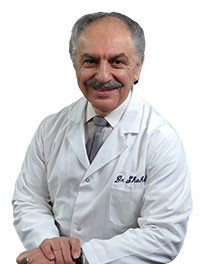Dialysis Treatment in Midland Park, NJ
What Is Dialysis?

The kidneys are a pair of organs that filter blood to remove waste and toxins from your body. When your kidneys become diseased or injured and cannot function properly, these toxins can accumulate in your body and become life-threatening. Dialysis is a medical treatment that uses a machine to filter and purify the blood the way healthy kidneys would normally. It is often necessary for individuals with chronic kidney disease or kidney failure to remove the waste from the body and prevent further complications, and ultimately, it can prolong your life.
To schedule a consultation with a healthcare practitioner in Midland Park who specializes in dialysis treatment, call (201) 806-6099 or contact Dr. M.T. Shahab online.
Why Do You Need Dialysis?
There are various conditions that can lead to the kidneys' inability to remove waste from your body, including a loss of blood flow to the kidneys. Other possible causes can include:
- Kidney injury
- Diseases such as high blood pressure (hypertension) or type 1 or 2 diabetes
- Conditions that block the urinary tract, such as kidney stones or an enlarged prostate
- Severe dehydration
- Certain medications
While acute kidney failure refers to the sudden loss of kidney function, chronic kidney failure—also known as chronic kidney disease —refers to a gradual loss of kidney function over a longer period of time. Untreated chronic kidney disease can eventually lead to end-stage kidney failure, where either dialysis or a kidney transplant are often required to keep you alive.
How Does Dialysis Work?
There are two main types of dialysis: hemodialysis and peritoneal dialysis. In hemodialysis, a machine is used to filter your blood outside your body and then returned to you. In peritoneal dialysis, a catheter is inserted into your abdomen, and dialysate is placed in your abdomen to absorb waste inside your body.
If it is determined that you require dialysis, your healthcare provider will help you decide which dialysis procedure is best for you. Factors to consider include:
- Kidney function and overall health
- Signs and symptoms
- Personal preferences
- Living situation
Hemodialysis
Preparation for hemodialysis will begin several weeks to months before your first procedure. A surgeon will create a vascular access in your body to safely feed a small amount of blood through the dialysis machine and then return it to your body.
There are three types of accesses:
- Arteriovenous (AV) fistula: The preferred method due to its effectiveness and safety, a surgically-created connection is made between an artery and a vein in your less-dominate arm.
- AV graft: A flexible, synthetic tube called a graft is used to create a path between an artery and a vein; this is usually done if your veins are too small for an AV fistula.
- Central venous catheter: In emergency situations, a temporary catheter will be inserted into a large vein in your neck or near your groin.
To begin the procedure, your weight, blood pressure, pulse, and temperature are checked. Two needles are then inserted into the access site. As you sit or recline in a chair, blood flows through the dialyzer—or artificial filter—that acts as your kidney. As excess fluid is pulled from your body, common symptoms can include nausea and abdominal cramps. Overall though, the procedure can be quite relaxing; as the dialyzer filters your blood, you can read, watch TV, or even sleep.
Peritoneal Dialysis
To prepare for peritoneal dialysis, a catheter will be surgically inserted near your belly button and require two weeks to heal. The purpose of this catheter is to carry dialysate in and out of your abdomen—a process called an exchange. Dialysate helps filter waste, chemicals, and extra fluid from the blood in the capillaries of the abdominal cavity lining called the peritoneum. During peritoneal dialysis, the dialysate flows into your abdomen and stays there for a dwell time of about 4-6 hours, after which the solution is emptied into a sterile collection bag.
There are two types of peritoneal dialysis, each one based on exchange schedules; continuous ambulatory peritoneal dialysis (CAPD) and continuous cycling peritoneal dialysis (CCPD). With CAPD, gravity moves the dialysate through the catheter and into and out of your abdomen; while the fluid is inside you, you can go about your normal activities. CAPD requires three to five exchanges throughout the day and can be done at work or home. CCPD, also known as automated peritoneal dialysis (APD), uses a machine called an automated cycler to perform multiple exchanges while you sleep; you also begin one exchange in the morning that lasts the entire day.
The success of peritoneal dialysis depends on several factors, including:
- Your size
- How much dialysis solution is used
- The concentration of sugar in the dialysis
- The number of daily exchanges and length of dwell times
While the benefits of peritoneal dialysis compared to hemodialysis include greater lifestyle independence and longer kidney function after treatment, peritoneal dialysis is not for everyone. Individuals who may not be qualified for peritoneal dialysis include those who are unable to properly care for themselves, or have conditions like a hernia, inflammatory bowel disease, or extensive surgical scars in the abdomen.
Living With Dialysis
Your dialysis treatment will be monitored with occasional blood tests to make sure that the procedure is working properly. While you're receiving dialysis, you'll also need to carefully monitor your intake of fluids, protein, sodium, potassium, and phosphorus. You should also avoid smoking and consuming alcohol, as these can harm your kidneys.
Overall, the effects of dialysis relieve many kidney failure symptoms and can prolong and improve your life. To make an appointment with a healthcare practitioner who specializes in dialysis in Midland Park, call (201) 806-6099 or contact Dr. M.T. Shahab online.
Medwell Orthopedics & Functional Medicine for Men & Women
Address
33 Central AveMidland Park, NJ 07432
(201) 806-6099
www.BergenCountyDoctors.com
Hours
Mon:
8:00 am - 8:00 pm
Tue:
2:00 pm - 7:00 pm
Wed:
8:00 am - 6:30 pm
Thu:
8:00 am - 1:00 pm
Fri:
8:00 am - 6:30 pm
Sat:
9:00 am - 1:00 pm
Sun:
By Appointment Only


